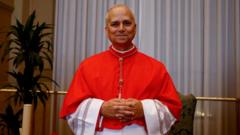Pope Leo XIV's election marks a historic shift and reflects a modern church that embraces diversity and new perspectives after overcoming traditional obstacles.
Papal Surprise: The Election of Pope Leo XIV

Papal Surprise: The Election of Pope Leo XIV
A promising American cardinal rises to lead the Vatican amidst global expectations.
In a surprising turn of events, Cardinal Robert Francis Prevost has emerged as the new leader of the Roman Catholic Church, being named Pope Leo XIV during the conclave held at the Vatican. His election stunned many, as he unified qualities essential for the modern church: American roots paired with a strong international ministry.
Born and educated in the United States, Prevost occupies a crucial position in terms of the Church's financial health. Yet he also spent significant time as a missionary in Peru, acting as the bishop and running the Pontifical Commission for Latin America. This duality symbolizes a vibrant global church, essential for its outreach.
The election was notably influenced by the endorsement of his predecessor, Pope Francis, who appointed Prevost to a high-ranking office where he successfully selected bishops and shaped the Church’s future. This connection offered a sense of continuity while substantiating Prevost's qualifications.
Prevost has garnered support from both liberal factions and conservatives within the Church. His keen understanding of community needs and his contributions towards a more participatory decision-making approach have put many at ease. At 69, he represents a balanced age for papal duties, able to engage with contemporary matters while maintaining respect for tradition.
Traditionally, a papal candidate’s nationality held weight during the selection process, particularly concerning American affiliations. However, with changing global dynamics, this aspect diminished in significance, allowing the cardinals to focus on Prevost’s extensive merit instead.
Prominent Vatican analyst John Allen remarked on the evolution of voting patterns, suggesting that geography and nationality no longer dominate the decision-making process. As the Church navigates through uncertain times, the selection of Pope Leo XIV can be seen as a reflection of its adaptive and inclusive nature moving forward.
Born and educated in the United States, Prevost occupies a crucial position in terms of the Church's financial health. Yet he also spent significant time as a missionary in Peru, acting as the bishop and running the Pontifical Commission for Latin America. This duality symbolizes a vibrant global church, essential for its outreach.
The election was notably influenced by the endorsement of his predecessor, Pope Francis, who appointed Prevost to a high-ranking office where he successfully selected bishops and shaped the Church’s future. This connection offered a sense of continuity while substantiating Prevost's qualifications.
Prevost has garnered support from both liberal factions and conservatives within the Church. His keen understanding of community needs and his contributions towards a more participatory decision-making approach have put many at ease. At 69, he represents a balanced age for papal duties, able to engage with contemporary matters while maintaining respect for tradition.
Traditionally, a papal candidate’s nationality held weight during the selection process, particularly concerning American affiliations. However, with changing global dynamics, this aspect diminished in significance, allowing the cardinals to focus on Prevost’s extensive merit instead.
Prominent Vatican analyst John Allen remarked on the evolution of voting patterns, suggesting that geography and nationality no longer dominate the decision-making process. As the Church navigates through uncertain times, the selection of Pope Leo XIV can be seen as a reflection of its adaptive and inclusive nature moving forward.























